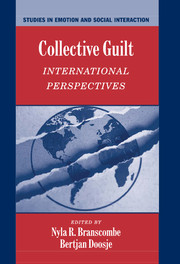Book contents
- Frontmatter
- Contents
- Preface
- List of Contributors
- Collective Guilt
- Section 1 Defining the nature of collective guilt
- Section 2 The Relationship Between Group Identification and Collective Guilt
- 6 Consequences of National Ingroup Identification for Responses to Immoral Historical Events
- 7 Refining the Meaning of the “Collective” in Collective Guilt: Harm, Guilt, and Apology in Australia
- 8 Exonerating Cognitions, Group Identification, and Personal Values as Predictors of Collective Guilt among Jewish-Israelis
- 9 It Depends on Your Point of View: Implications of Perspective-Taking and National Identification for Dutch Collective Guilt
- 10 Collective Guilt, National Identity, and Political Processes in Contemporary Germany
- Section 3 Consequences for Intergroup Relations
- Section 4 Commentary on the Volume
- Index
- References
6 - Consequences of National Ingroup Identification for Responses to Immoral Historical Events
Published online by Cambridge University Press: 05 January 2012
- Frontmatter
- Contents
- Preface
- List of Contributors
- Collective Guilt
- Section 1 Defining the nature of collective guilt
- Section 2 The Relationship Between Group Identification and Collective Guilt
- 6 Consequences of National Ingroup Identification for Responses to Immoral Historical Events
- 7 Refining the Meaning of the “Collective” in Collective Guilt: Harm, Guilt, and Apology in Australia
- 8 Exonerating Cognitions, Group Identification, and Personal Values as Predictors of Collective Guilt among Jewish-Israelis
- 9 It Depends on Your Point of View: Implications of Perspective-Taking and National Identification for Dutch Collective Guilt
- 10 Collective Guilt, National Identity, and Political Processes in Contemporary Germany
- Section 3 Consequences for Intergroup Relations
- Section 4 Commentary on the Volume
- Index
- References
Summary
When people in the Western World see pictures of children starving in the Third World, they may feel guilty about their own wealth and wonder about the causes of these differences. Indeed, the explanations for such social inequalities have been center stage in much social and political thought (Abernethy, 2001; Landes, 1999; Leach, Snider, & Iyer, 2002). For example, Daimond (1997) considered global differences in wealth in terms of people's natural environments. In addition to such natural causes, human behavior toward other humans has played an important role in the creation of worldwide differences in wealth (Brooks, 1999). Specifically, slavery and colonization practices have played a powerful role in increasing international inequality in wealth. Making salient such inequalities in wealth has the potential to trigger feelings of collective guilt in dominant group members. In this chapter, we are particularly interested in the consequences of ingroup identification for feelings of collective guilt.
Not all members of dominant groups experience collective guilt as a consequence of being confronted with ingroup-perpetrated immoral historical events. We argue that in order to understand why and when members of dominant groups experience collective guilt, the degree to which people identify with their national group needs to be taken into account. In this chapter, we focus mainly on the Dutch colonization of Indonesia and the resulting inequalities in wealth as a source of collective guilt among Dutch people.
- Type
- Chapter
- Information
- Collective GuiltInternational Perspectives, pp. 95 - 111Publisher: Cambridge University PressPrint publication year: 2004
References
- 27
- Cited by

